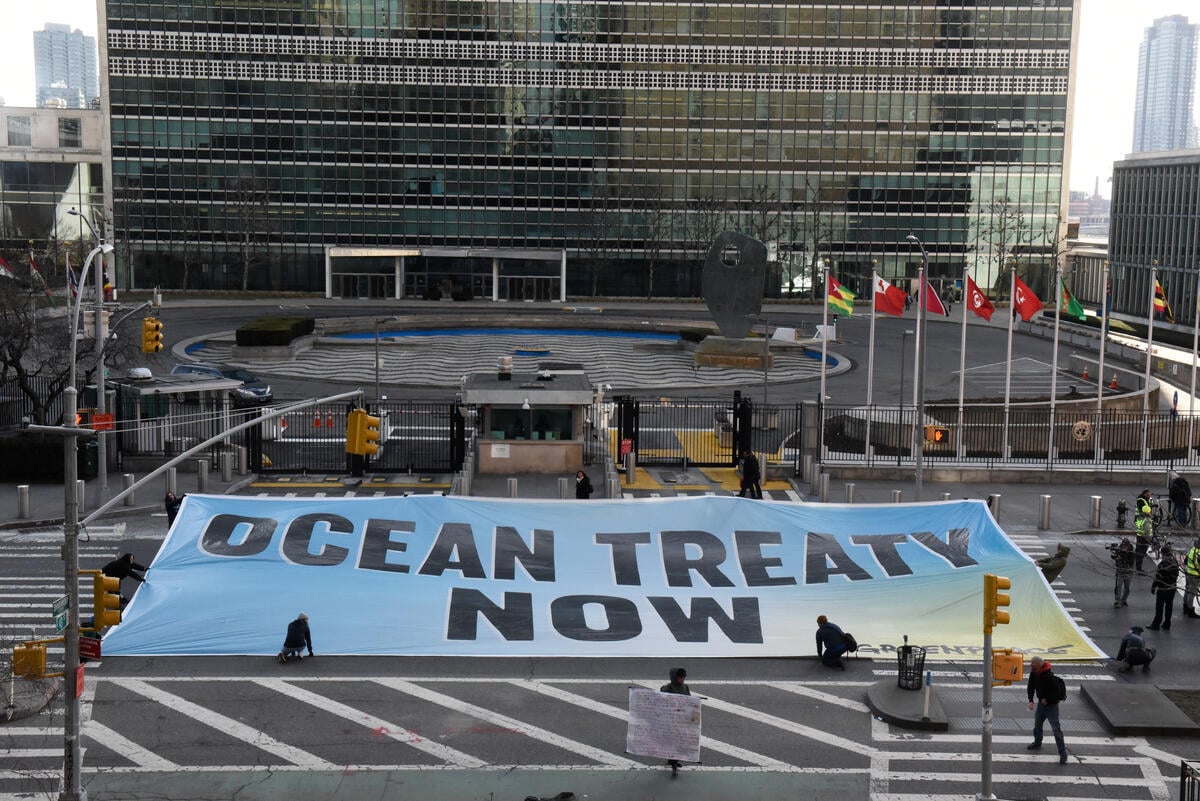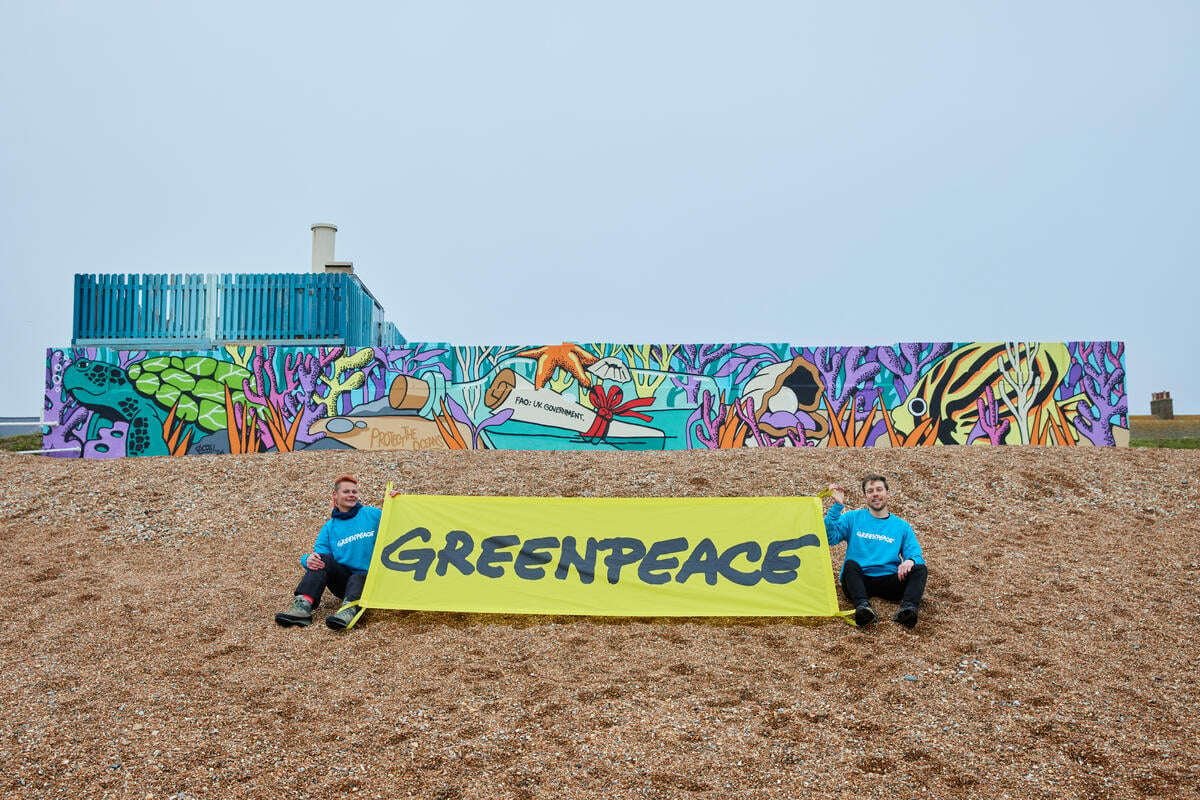Stavanger, Norway – Greenpeace International released a new report Gambling with the deep sea: Those betting on mining the Arctic exposing the Norwegian government and companies’ efforts to start deep sea mining in the Arctic, today. At the time of release, activists from Greenpeace Nordic launched a protest action against Loke Marine Minerals, a Norwegian company that wants to start deep sea mining in the depths of the Arctic and the Pacific Oceans. Loke has been outspoken in its ambition to become the world’s largest producer of controversial seabed minerals.
Haldis Tjeldflaat Helle, Campaigner, Greenpeace Nordic, said: “Loke Marine Minerals is committed to mining the oceans regardless of warnings from scientists, fisheries and civil society. We cannot let this dangerous industry with no social license bully governments into allowing destruction of some of the most pristine ecosystems on earth, so we are here to make sure they hear the voices from the millions of people who oppose deep sea mining. This company is named after the Norse god Loke, who was known to be a deceitful trickster. But we cannot let Loke play tricks and gamble with the health of the ocean.”
Greenpeace Nordic invited Loke Marine Minerals to join a panel debate in Stavanger this week, but as they declined, the activist group instead decided to come knocking on their door. Greenpeace Nordic activists were at the company headquarters in Stavanger with a giant inflatable pink octopus, a “deep sea betting”[1] slot machine and replaced the company logo on the building with “Loke – playing tricks again”.
Viking actor and Greenpeace ambassador Gustaf Skarsgård, arrived together with his brother Valter Skarsgård to the site of the protest and said:
“The oceans are already in crisis. Climate change, overfishing and pollution is pushing the oceans to the brink of collapse. Deep sea mining would bring destruction into one of the last ecosystems that so far has been protected from human exploitation. We must put our resources into better knowledge of the ecosystems in the ocean and how we can protect them, not into how to destroy yet another part of the ocean.”
In March 2023, Loke bought UK Seabed Resources, a subsidiary of the world’s largest arms manufacturer, Lockheed Martin. Included in the purchase were two exploration licenses for deep sea mining in the Clarion Clipperton Zone in the Pacific Ocean, sponsored by the UK Government. Loke is also pursuing exploitation licenses in the area that the Norwegian government opened up for mining in the Arctic. Loke aims to mine the thick, rocky crust of the Arctic seabed itself, called manganese crusts. These crusts are up to 40 centimetres thick[2], and each centimetre is believed to have taken one million years to build up. Scientists have warned[3] that the slow development of these ecosystems in the Arctic and the Pacific will face irreparable damage if mining is permitted to start.
The pursuit of deep sea mining has been met with resistance from Indigenous communities, particularly in the Pacific, but also by the Saami Council and the Inuit Circumpolar Council Greenland. In addition to resistance from environmental groups and hundreds of concerned scientists[4], some of the world’s biggest companies[5], including Google, Apple, Samsung, Volvo and BMW, and 32 countries[6] have voiced support for either a ban or a pause on deep sea mining.
ENDS
Photos for press available in the Greenpeace Media Library
Notes:
[1] The “deep sea betting” slot machine can be viewed at deepseabetting.greenpeace.no
[2] This is according to the Norwegian Offshore Directorate.
[3] This is according to the article Assessment of scientific gaps related to the effective environmental management of deep-seabed mining by Amon et al. (2022) available from Science Direct.
[4] 827 marine scientists and policy experts signed onto a statement calling for a pause to deep-sea mining.
[5] 60 companies have signed the business statement calling for a moratorium on deep-sea mining.
[6] Government bodies and elected officials are calling for a moratorium on deep-sea mining.
In January, a majority of the Norwegian Parliament voted for the country to open its seabed for commercial mining activities. The move has been heavily criticised by the international community, including the European Parliament. In June, the Norwegian Ministry of Energy presented a proposal for the first licensing round for seabed minerals for public consultation. The proposal sets out the areas where mining companies will be able to apply for exploitation licences. The licences include a mapping phase, after which the company can submit a plan for exploitation for approval. Despite the warnings from the scientific community, the Norwegian government aims to hand out the first licences next year, and for mining to start as soon as 2030.
Today’s report follows a recent review of scientific literature, Deep Sea Mining in the Arctic: Living Treasures at Risk, which shows that if Norway’s deep sea mining plans go ahead, they will cause irreversible harm to biodiversity in the Arctic deep sea.
Contacts:
Daniel Bengtsson, Head of Communication, Greenpeace Nordic: [email protected], +46 70 300 95 10
Louisa Casson, Campaign Lead for the Stop Deep Sea Mining campaign, Greenpeace International: [email protected], +44 7772 304 063
Greenpeace International Press Desk, +31 (0)20 718 2470 (available 24 hours), [email protected]. Follow @greenpeacepress for our latest international press releases.



